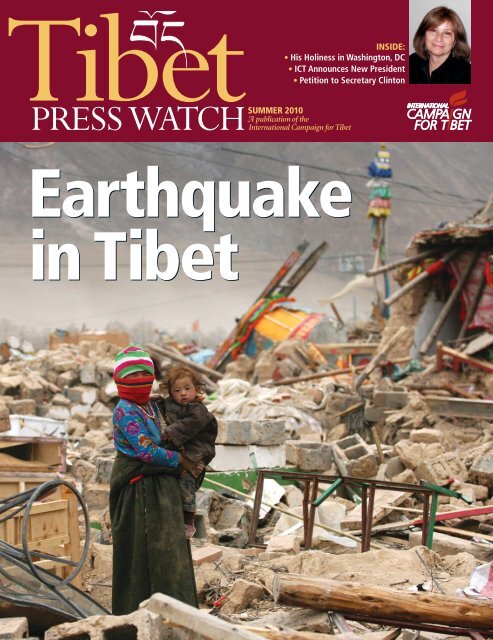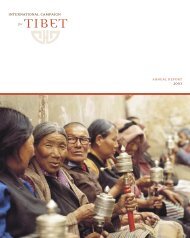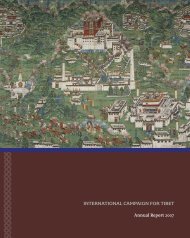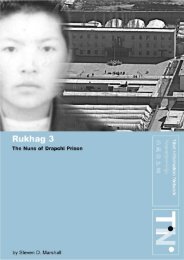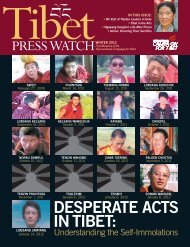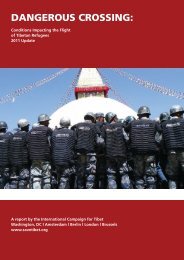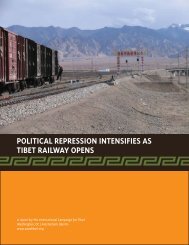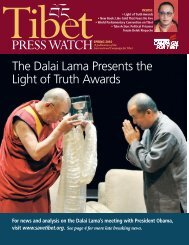Download the full edition - International Campaign for Tibet
Download the full edition - International Campaign for Tibet
Download the full edition - International Campaign for Tibet
You also want an ePaper? Increase the reach of your titles
YUMPU automatically turns print PDFs into web optimized ePapers that Google loves.
<strong>Tibet</strong><br />
2010<br />
PRESS WATCH<br />
SUMMER<br />
INSIDE:<br />
• His Holiness in Washington, DC<br />
• ICT Announces New President<br />
• Petition to Secretary Clinton<br />
A publication of <strong>the</strong><br />
<strong>International</strong> <strong>Campaign</strong> <strong>for</strong> <strong>Tibet</strong><br />
Earthquake<br />
in <strong>Tibet</strong>
Become a<br />
Friendof<strong>Tibet</strong><br />
When you become a Friend of<br />
<strong>Tibet</strong> and pledge to contribute just<br />
$10 a month or more (that’s just<br />
33¢ a day) to <strong>the</strong> <strong>International</strong><br />
<strong>Campaign</strong> <strong>for</strong> <strong>Tibet</strong>, you give us a<br />
reliable fund that allows us to act<br />
immediately and strategically to<br />
benefit <strong>the</strong> people and culture<br />
of <strong>Tibet</strong>.<br />
You’ll be working <strong>for</strong> justice and<br />
compassion with just <strong>the</strong> spare<br />
change in your pocket.<br />
Can we count on you to be a<br />
Friend of <strong>Tibet</strong><br />
To establish a Friend of <strong>Tibet</strong><br />
monthly gift, please visit us online<br />
at savetibet.org/friendsoftibet or<br />
use <strong>the</strong> enclosed envelope to<br />
request more in<strong>for</strong>mation.<br />
Should <strong>the</strong> need arise, you can<br />
change or cancel your pledge at<br />
any time. Thank you!<br />
Did you know you can change a life <strong>for</strong> only 33¢ a day<br />
Find out how at savetibet.org/friendsoftibet<br />
2
From <strong>the</strong><br />
Board of Directors<br />
TIBET PRESSWATCH<br />
The <strong>International</strong> <strong>Campaign</strong> <strong>for</strong> <strong>Tibet</strong><br />
works to promote human rights<br />
and democratic freedoms <strong>for</strong><br />
<strong>the</strong> people of <strong>Tibet</strong>.<br />
Founded in 1988, ICT is a non-profit<br />
membership organization with offices<br />
in Washington, D.C., Amsterdam,<br />
Berlin and Brussels,<br />
and field offices in<br />
Dharamsala and Kathmandu.<br />
EXECUTIVE OFFICERS<br />
Richard Gere, Chairman<br />
Lodi Gyari, Executive Chair<br />
Mary Beth Markey, President<br />
Bhuchung Tsering,V.P. Special Programs<br />
BOARD OF DIRECTORS<br />
John Ackerly<br />
Ellen Bork<br />
Richard Gere<br />
Lodi Gyari<br />
Jim Kane<br />
Tony Karam<br />
Melissa Mathison<br />
Joel McCleary<br />
Keith Pitts<br />
Steve Schroeder<br />
Gare Smith<br />
Grace Spring<br />
We’re delighted to announce <strong>the</strong> appointment of Mary Beth Markey, <strong>for</strong>merly our Vice<br />
President <strong>for</strong> <strong>International</strong> Advocacy, as ICT’s new President. The Board of Directors<br />
has been through a comprehensive search <strong>for</strong> <strong>the</strong> next president of <strong>the</strong> <strong>International</strong><br />
<strong>Campaign</strong> <strong>for</strong> <strong>Tibet</strong>, and we’ve been inspired by <strong>the</strong> extraordinary quality of <strong>the</strong><br />
applicants. At <strong>the</strong> end of <strong>the</strong> process, we know we’ve made <strong>the</strong> ideal choice by turning<br />
to one of our own.<br />
For fourteen years, Mary Beth has focused on U.S. government relations and international<br />
advocacy at ICT and holds within her mind and spirit a realistic understanding<br />
of how international support can help and should help in <strong>the</strong> mission to support His<br />
Holiness <strong>the</strong> Dalai Lama and <strong>the</strong> people of <strong>Tibet</strong>. Her history in governmental circles,<br />
including a tenure working under <strong>the</strong>n Chairman Claiborne Pell (D-RI) on <strong>the</strong> Senate<br />
Foreign Relations Committee, means she’s well versed with respect to U.S. policy and<br />
capabilities. Not only are her credentials excellent, but Mary Beth is a dedicated,<br />
capable leader. Outside of ICT, Mary Beth is held in high esteem by o<strong>the</strong>rs in <strong>the</strong><br />
international <strong>Tibet</strong> movement and <strong>the</strong> <strong>Tibet</strong>an exile community. Moreover, Mary Beth’s<br />
heart connection to this issue is obvious to those who have worked with her.<br />
As Mary Beth <strong>for</strong>mally assumes <strong>the</strong> reins, we know we’re in excellent hands. She is only<br />
<strong>the</strong> fourth president in ICT history; succeeding Tenzin N. Tethong (one of ICT’s<br />
founders), ICT Executive Chair Lodi Gyari, and past president and current board<br />
member John Ackerly. We know that with Mary Beth’s appointment, we enter a new and<br />
exciting phase in our organization’s history, and invite you to share in our pride.<br />
The work we do toge<strong>the</strong>r is essential to inspiring international support <strong>for</strong> <strong>Tibet</strong> — and<br />
until human rights and democratic freedoms are no longer being brutally suppressed<br />
and <strong>Tibet</strong>ans are allowed to practice <strong>the</strong>ir ancient religious and cultural heritage, our role<br />
as advocates remains critical.<br />
We thank Mary Beth <strong>for</strong> serving as our president — and thank you <strong>for</strong> standing with<br />
us, and with <strong>the</strong> people of <strong>Tibet</strong>.<br />
CONTACT INFORMATION<br />
<strong>International</strong> <strong>Campaign</strong> <strong>for</strong> <strong>Tibet</strong><br />
1825 Jefferson Pl, NW<br />
Washington, DC 20036<br />
202-785-1515<br />
www.savetibet.org<br />
info@savetibet.org<br />
Newsletter Design:<br />
Wm. Whitehead Design<br />
Editorial Support:<br />
Pru Bovee and<br />
Mal Warwick Associates<br />
Cover photo: REUTERS/Donald Chan<br />
Mary Beth Markey at <strong>the</strong> <strong>Tibet</strong>an Children’s Village School in Dharamsala, India.<br />
3
<strong>Tibet</strong> Press Coverage<br />
News from around <strong>the</strong> World<br />
When His Holiness <strong>the</strong> Dalai Lama meets with a U.S. President,<br />
China is an unseen but clearly-felt presence in <strong>the</strong> room. This<br />
fact is understandable as both parties are engaged and invested<br />
in China’s cooperation on fundamental issues.<br />
The Obama Administration has from <strong>the</strong> outset made its<br />
interest clear in a cooperative, comprehensive and positive U.S.-<br />
Chinese relationship, and both <strong>the</strong> President and Secretary of<br />
State made visits to Beijing an early priority. Of course, <strong>the</strong><br />
Dalai Lama continues to seek genuine autonomy <strong>for</strong> <strong>Tibet</strong>ans<br />
within <strong>the</strong> People’s Republic of China, and his envoys have had<br />
nine rounds of dialogue with Chinese officials. It is ra<strong>the</strong>r ironic<br />
<strong>the</strong>n that China appears to have removed itself from <strong>the</strong> realm<br />
of cooperation, at least on <strong>Tibet</strong>, and has taken a seemingly<br />
more intractable position than ever. The Chinese political leadership<br />
has elevated <strong>Tibet</strong> to a so-called “core concern” of sovereignty<br />
and territorial integrity, which signals that <strong>the</strong>y want it<br />
off <strong>the</strong> table as an issue <strong>for</strong> discussions with world leaders.<br />
None<strong>the</strong>less, <strong>the</strong> Dalai Lama’s discussions with President<br />
Obama and Secretary of State Clinton in February went well.<br />
The Dalai Lama himself said “<strong>the</strong> administration is <strong>full</strong>y<br />
supportive of our middle way approach: very clear, very<br />
specific.” Far from stepping away, <strong>the</strong> President and Secretary<br />
of State have demonstrated that <strong>Tibet</strong> remains on <strong>the</strong> table.<br />
The Dalai Lama’s Well-Traveled Road: Democracy by Carl Gershman<br />
The Washington Post, February 16, 2010<br />
Now that <strong>the</strong> White House has announced that President<br />
Obama will receive <strong>the</strong> Dalai Lama, it is important that he be<br />
welcomed not only as a moral and religious leader respected<br />
throughout <strong>the</strong> world but also as a fellow democrat who shares<br />
America’s deepest values.<br />
This is not an aspect of <strong>the</strong> Dalai Lama that is well understood,<br />
especially by those who see him as <strong>the</strong> spiritual leader of a<br />
traditional people. Yet he is a devoted democrat who has<br />
defended <strong>the</strong> universality of <strong>the</strong> democratic idea against <strong>the</strong><br />
“Asian values” argument of various autocrats and who has tried,<br />
even be<strong>for</strong>e he fled <strong>Tibet</strong> in 1959, to modernize <strong>Tibet</strong>’s system<br />
of government.<br />
<strong>the</strong> moral integrity of <strong>the</strong> <strong>Tibet</strong>an struggle and <strong>the</strong> possibility<br />
<strong>for</strong> an eventual reconciliation with China. By demonstrating<br />
moral courage and self-assurance in <strong>the</strong> face of China’s brute<br />
<strong>for</strong>ce and abusive insults, he has given hope against hope not<br />
just to his own people but to oppressed people everywhere.<br />
The Dalai Lama has given <strong>the</strong> world a model of how to pursue<br />
democracy and live according to its values. By refusing to<br />
relinquish <strong>the</strong> principle of nonviolence despite <strong>the</strong> terrible<br />
violence that has been inflicted on <strong>Tibet</strong>ans, he has preserved<br />
Photo © Sonam Zoksang<br />
His Holiness <strong>the</strong> Dalai Lama with NED President Carl Gershman<br />
and NED Vice Chairman Dr. Judy Shelton.<br />
Photo © Pete Souza<br />
The National Endowment <strong>for</strong> Democracy (NED) presented<br />
His Holiness <strong>the</strong> Dalai Lama with <strong>the</strong> Democracy Service<br />
Medal in recognition of <strong>the</strong> <strong>Tibet</strong>an spiritual leader’s commitment<br />
to advancing <strong>the</strong> principles of democracy and human<br />
dignity on February 19, 2010 in <strong>the</strong> Coolidge Auditorium at <strong>the</strong><br />
Library of Congress. The Dalai Lama addressed an audience<br />
of approximately 500 at his only public appearance during his<br />
Washington visit.<br />
4
Talking about <strong>Tibet</strong><br />
An Open Dialogue between Chinese Citizens and <strong>the</strong> Dalai Lama<br />
New York Review of Books Blog, May 2010<br />
Wang Lixiong at <strong>the</strong> 2009 ICT Light of<br />
Truth Award ceremony.<br />
The following exchange was<br />
organized by Wang Lixiong,<br />
a Chinese intellectual known<br />
<strong>for</strong> his writing on <strong>Tibet</strong><br />
and <strong>for</strong> <strong>the</strong>orizing about<br />
how China might generate<br />
its own kind of democracy<br />
in <strong>the</strong> Internet age.<br />
Wang opened a Twitter page onto which<br />
Chinese Web users could pose questions<br />
and vote <strong>for</strong> <strong>the</strong> questions <strong>the</strong>y preferred.<br />
By <strong>the</strong> deadline, 282 questions had been<br />
submitted and 12,045 votes <strong>for</strong> questions<br />
had been cast. Wang said that he was<br />
“very pleased” with this response and<br />
that <strong>the</strong> questions that rose to <strong>the</strong> top of<br />
<strong>the</strong> pile were indeed, in his view, a good<br />
representation of <strong>the</strong> actual concerns on<br />
<strong>the</strong> minds of Chinese citizens. The dialogue<br />
was reprinted in <strong>the</strong> New York<br />
Review of Books Blog and <strong>the</strong>se were<br />
among <strong>the</strong> questions and responses:<br />
Photo © Sonam Zoksang<br />
Question: I want to ask you about <strong>the</strong> religious<br />
leadership of <strong>Tibet</strong> in <strong>the</strong> future.<br />
Dalai Lama: In 1969 I issued a <strong>for</strong>mal<br />
declaration that <strong>the</strong> question of whe<strong>the</strong>r<br />
<strong>the</strong> Dalai Lama system should continue is<br />
a question <strong>for</strong> <strong>the</strong> <strong>Tibet</strong>an people to<br />
decide. In 1992 I issued ano<strong>the</strong>r declaration,<br />
making clear that as soon as <strong>Tibet</strong><br />
might gain <strong>for</strong>mal autonomy, I would<br />
hold no official position in a <strong>Tibet</strong>an<br />
government and that all <strong>Tibet</strong>an affairs<br />
would continue to be handled by officials<br />
serving in <strong>the</strong>ir posts inside <strong>Tibet</strong>. Then,<br />
in 2001 <strong>the</strong> <strong>Tibet</strong>an government in exile<br />
adopted a system to elect leaders to fiveyear<br />
terms of office by popular vote of<br />
<strong>the</strong> <strong>Tibet</strong>an community in exile. In view<br />
of <strong>the</strong>se developments, I have come to<br />
feel that <strong>the</strong> Dalai Lama system is no<br />
longer very important. I am going to<br />
continue to do my best in my role as long<br />
as my health holds up, but as <strong>for</strong> <strong>the</strong><br />
Dalai Lama system, I have to say that <strong>the</strong><br />
Chinese government cares more about<br />
this than I do (laughs).<br />
Question: I would like to ask Your Holiness<br />
about <strong>the</strong> meetings between <strong>the</strong><br />
<strong>Tibet</strong>an government in exile and <strong>the</strong><br />
Chinese Communists. Why are <strong>the</strong>se<br />
meetings always fruitless What exactly<br />
are <strong>the</strong> questions that have been so<br />
intractable over <strong>the</strong> decades<br />
Dalai Lama: The main problem is that<br />
<strong>the</strong> Chinese government continually insists<br />
that <strong>the</strong>re is no <strong>Tibet</strong> problem, only<br />
a Dalai Lama problem. I have made no<br />
demands of my own, but am primarily<br />
concerned with six million <strong>Tibet</strong>ans and<br />
<strong>the</strong>ir culture, especially <strong>the</strong>ir religion and<br />
<strong>the</strong>ir natural environment. If a day comes<br />
when Chinese leaders acknowledge a<br />
“<strong>Tibet</strong> question” and if <strong>the</strong>y are ready to<br />
face it and work <strong>for</strong> its solution, I will<br />
lend my <strong>full</strong> support, because our goals<br />
— to build, develop and unify <strong>Tibet</strong> —<br />
will <strong>the</strong>n be <strong>the</strong> same. At present <strong>the</strong><br />
Communists are relying on <strong>for</strong>cible<br />
The main problem is that<br />
<strong>the</strong> Chinese government<br />
continually insists that <strong>the</strong>re<br />
is no <strong>Tibet</strong> problem, only a<br />
Dalai Lama problem.<br />
methods. They repeatedly stress“stability”<br />
in <strong>Tibet</strong>. My belief is that true stability<br />
comes from inner confidence and trust.<br />
Question: If <strong>the</strong> regime were to allow<br />
you to return to <strong>Tibet</strong>, and were to grant<br />
self-rule to <strong>Tibet</strong>, what kind of political<br />
system would you like to see in <strong>Tibet</strong><br />
Dalai Lama: This question will be <strong>for</strong><br />
<strong>Tibet</strong>ans inside <strong>Tibet</strong>, especially intellectuals,<br />
in a spirit of “seeking truth from<br />
facts,” to decide <strong>for</strong> <strong>the</strong>mselves. Our<br />
<strong>Tibet</strong>an society in exile, <strong>for</strong> <strong>the</strong> past 50<br />
years, has already achieved democratization<br />
in its social system.<br />
Question: In view of how things stand at<br />
present, <strong>the</strong> chances of a peaceful resolution<br />
of <strong>the</strong> problem of <strong>Tibet</strong> seem almost<br />
zero. May I ask how Your Holiness views<br />
<strong>the</strong> current prospects <strong>for</strong> <strong>Tibet</strong><br />
Dalai Lama: During 60 years of Chinese<br />
Communist rule, <strong>the</strong> eras of Mao Zedong,<br />
Deng Xiaoping, Jiang Zemin, and Hu<br />
Jintao have all been different. In fact <strong>the</strong>re<br />
have been some very major changes.<br />
I feel confident that changes in [China’s]<br />
nationalities policy will come, and in particular<br />
that <strong>the</strong> <strong>Tibet</strong> problem can be<br />
solved on <strong>the</strong> basis of mutual interest.<br />
Some retired officials and Party members<br />
who used to work on <strong>Tibet</strong>an affairs —<br />
as well as some Chinese intellectuals —<br />
have begun to point out irrationalities<br />
in minority policy and <strong>the</strong> need <strong>for</strong> a<br />
re-thinking of nationalities policy. This<br />
is why I feel <strong>the</strong>re will be changes in <strong>the</strong><br />
not-so-distant future, and that problems<br />
can be solved.<br />
5
ICT Responds<br />
Press Releases from <strong>the</strong> <strong>International</strong> <strong>Campaign</strong> <strong>for</strong> <strong>Tibet</strong><br />
The Serious Agenda <strong>for</strong><br />
President Obama and <strong>the</strong><br />
Dalai Lama<br />
February 10, 2010<br />
Today’s meetings of His Holiness <strong>the</strong> Dalai<br />
Lama with President Barack Obama, in<br />
<strong>the</strong> late morning, and with Secretary of<br />
State Hillary Clinton, in <strong>the</strong> early afternoon,<br />
underscore that <strong>Tibet</strong> remains a<br />
serious issue of global importance.<br />
President Obama enters <strong>the</strong> meeting<br />
facing <strong>the</strong> fact that <strong>the</strong> Chinese government<br />
has elevated <strong>Tibet</strong> to a “core issue”<br />
of territorial integrity and sovereignty,<br />
launched an ef<strong>for</strong>t to align <strong>for</strong>eign governments<br />
with its way of thinking on <strong>the</strong><br />
status of <strong>Tibet</strong>, and concluded a rare topto-bottom<br />
review of its <strong>Tibet</strong> policy with<br />
serious repercussions <strong>for</strong> <strong>Tibet</strong>’s future.<br />
His meeting also comes just three weeks<br />
after <strong>the</strong> Dalai Lama’s envoys returned<br />
from Beijing <strong>for</strong> <strong>the</strong> ninth round of<br />
dialogue, in which <strong>the</strong> envoys conveyed<br />
fur<strong>the</strong>r in<strong>for</strong>mation on <strong>the</strong>ir proposal <strong>for</strong><br />
genuine autonomy <strong>for</strong> <strong>Tibet</strong>ans, in <strong>the</strong>ir<br />
continuing ef<strong>for</strong>t to resolve <strong>the</strong> <strong>Tibet</strong><br />
issue through substantive negotiations.<br />
<strong>Tibet</strong>ans Celebrate<br />
Dalai Lama Meeting<br />
with President Obama<br />
Despite Crackdown<br />
February 19, 2010<br />
In a second day of celebration, on February<br />
18, <strong>Tibet</strong>ans defied intense security<br />
by chanting prayers and setting off fireworks<br />
in <strong>the</strong> Amdo area of <strong>Tibet</strong>, where<br />
<strong>the</strong> Dalai Lama was born, marking his<br />
meeting with President Obama that day.<br />
The <strong>Tibet</strong>an source said that while security<br />
appeared to be stepped up in an area<br />
already under crackdown, <strong>the</strong>re were no<br />
detentions. He said: “The purpose of <strong>the</strong><br />
ceremony was to mark <strong>the</strong> meeting between<br />
His Holiness <strong>the</strong> Dalai Lama and<br />
President Barack Obama in <strong>the</strong> hopes<br />
that it will bring a productive outcome<br />
<strong>for</strong> <strong>Tibet</strong>’s future. We are very happy<br />
about <strong>the</strong> meeting and we are praying<br />
and making offerings to ensure <strong>the</strong>re is<br />
justice and truth <strong>for</strong> this cause.”<br />
Hundreds Killed in<br />
Earthquake in Kyegudo,<br />
Eastern <strong>Tibet</strong>: Emergency<br />
Appeals Launched<br />
April 14, 2010<br />
Hundreds have been killed in <strong>the</strong> <strong>Tibet</strong>an<br />
area of Yushu when a series of strong<br />
earthquakes measured at magnitude 6.9<br />
hit <strong>the</strong> region this morning. Reports in<br />
<strong>the</strong> state media say that at least 400<br />
people have been killed and thousands<br />
of o<strong>the</strong>rs injured, and it is not known<br />
how many are still buried in <strong>the</strong> rubble.<br />
Aid workers in contact with <strong>the</strong> region<br />
say that <strong>the</strong> death toll is certain to rise,<br />
with one official saying that in <strong>the</strong> last<br />
few hours it has exceeded a thousand,<br />
although this is currently impossible to<br />
confirm.<br />
At least 80% of <strong>the</strong> buildings are said to<br />
be flattened in Jyeku, which has a population<br />
of at least 100,000 people according<br />
to <strong>the</strong> state news agency Xinhua,<br />
including <strong>Tibet</strong>ans and Chinese migrant<br />
workers. Local officials said <strong>the</strong>re is no<br />
power or water, <strong>the</strong>re are reports that a<br />
hospital is damaged, and at least one<br />
school has collapsed, trapping its students.<br />
Many local people have fled to <strong>the</strong><br />
mountains, and desperate attempts are<br />
ongoing to drain water from a local<br />
reservoir where a large fissure appeared<br />
in <strong>the</strong> wall of a hydropower station dam.<br />
Envoy Urges Chinese<br />
Response to Dalai Lama’s<br />
Wish to Visit Earthquake<br />
Victims; Rebuts Chinese<br />
Charges of Exploitation<br />
May 12, 2010<br />
Lodi Gyaltsen Gyari, Special Envoy of His<br />
Holiness <strong>the</strong> Dalai Lama, has urged <strong>the</strong><br />
Chinese central government to respond<br />
positively to <strong>the</strong> Dalai Lama’s request to<br />
visit <strong>the</strong> earthquake hit <strong>Tibet</strong>an area of<br />
Kyegudo, and he has strongly criticized<br />
Chinese allegations of exploitation by <strong>the</strong><br />
<strong>Tibet</strong>an government in exile in relation<br />
to <strong>the</strong> earthquake.<br />
Speaking today on Voice of America,<br />
Lodi Gyari said: “If <strong>the</strong> Chinese leaders<br />
are able to make <strong>the</strong> far-sighted decision<br />
to allow His Holiness <strong>the</strong> Dalai Lama to<br />
visit Kyegudo, <strong>the</strong>n it will create unprecedented<br />
good will among <strong>Tibet</strong>ans everywhere,<br />
especially <strong>Tibet</strong>ans most affected<br />
by <strong>the</strong> earthquake.”<br />
Lodi Gyari, Special Envoy of His Holiness <strong>the</strong><br />
Dalai Lama and ICT Executive Chairman<br />
To read <strong>the</strong> <strong>full</strong> text of <strong>the</strong>se press releases, please visit savetibet.org.<br />
6
From <strong>the</strong> ICT Blog<br />
The following are excerpts from blog postings;<br />
to read <strong>the</strong> <strong>full</strong> posts, please visit weblog.savetibet.org<br />
Spiritual Sustenance<br />
of <strong>Tibet</strong>an Earthquake<br />
Victims and Chinese<br />
Insensitivity<br />
Posted by Bhuchung K. Tsering,<br />
April 16, 2010<br />
The devastating earthquake in Yushu<br />
<strong>Tibet</strong>an Autonomous Prefecture on April<br />
14, 2010, whose impacts are still being<br />
analyzed as I write,<br />
has highlighted <strong>the</strong><br />
humane aspect of<br />
<strong>the</strong> <strong>Tibet</strong>an issue.<br />
Bhuchung K.<br />
Tsering<br />
While material assistance<br />
will help<br />
those injured and<br />
affected physically,<br />
<strong>for</strong> <strong>the</strong> rising number<br />
of <strong>Tibet</strong>ans and<br />
o<strong>the</strong>rs who have<br />
lost <strong>the</strong>ir lives, spiritual sustenance plays<br />
a hugely important role. As was witnessed<br />
by media representatives at <strong>the</strong><br />
site, <strong>the</strong> people wait <strong>for</strong> <strong>the</strong> appropriate<br />
spiritual rituals to be undertaken be<strong>for</strong>e<br />
<strong>the</strong> bodies of those who have died are<br />
disposed of.<br />
In this regard, His Holiness <strong>the</strong> Dalai<br />
Lama has not only come out with a written<br />
message offering his prayers, but a<br />
video recording of his reference to <strong>the</strong><br />
tragedy has been posted on his website.<br />
Many affected people in Yushu and <strong>the</strong>ir<br />
relatives in <strong>Tibet</strong> and China have learned<br />
of His Holiness’s prayers and have expressed<br />
profound spiritual relief. If <strong>the</strong><br />
Chinese Government is really concerned<br />
about <strong>the</strong> overall welfare of <strong>the</strong> <strong>Tibet</strong>ans<br />
affected by <strong>the</strong> earthquake, it should be<br />
logical <strong>for</strong> <strong>the</strong>m to let <strong>the</strong> <strong>Tibet</strong>ans in<br />
Yushu know that <strong>the</strong> Dalai Lama has<br />
prayed <strong>for</strong> <strong>the</strong> dead and <strong>the</strong> injured.<br />
Un<strong>for</strong>tunately, to <strong>the</strong> Chinese propaganda<br />
machinery devoted to <strong>Tibet</strong>, it<br />
looks like <strong>the</strong>y are in a situation of politics<br />
as usual. At a time when all <strong>Tibet</strong>ans<br />
and a majority of <strong>the</strong> Chinese people<br />
(I want to believe) are expressing solidarity<br />
and sympathy with <strong>the</strong> families of<br />
<strong>Tibet</strong>ans who have died in <strong>the</strong> devastating<br />
earthquake in Yushu, <strong>the</strong> Chinese<br />
media have shown <strong>the</strong>ir insensitivity by<br />
coming out with articles about <strong>the</strong> “Dalai<br />
Clique” and criticizing <strong>the</strong> one spiritual<br />
leader who can provide <strong>the</strong> needed<br />
spiritual succor to <strong>the</strong> affected <strong>Tibet</strong>ans.<br />
Media Monopoly —<br />
With Chinese<br />
Characteristics<br />
Posted by ICT Guest Blogger<br />
Oystein Alme, April 30, 2010<br />
Oystein Alme (born 1960) is <strong>the</strong><br />
Norwegian director of <strong>the</strong> Foundation<br />
Voice of <strong>Tibet</strong>.<br />
A week has passed since <strong>the</strong> terrible<br />
quake hit <strong>the</strong> Kyegudo area in <strong>Tibet</strong> with<br />
thousands of casualties. This morning<br />
Associated Press (AP) has spread <strong>the</strong> news<br />
across <strong>the</strong> world that our radio station,<br />
Voice of <strong>Tibet</strong>, has established a call-in<br />
service to convey messages of condolence<br />
to <strong>Tibet</strong> through separate programs<br />
beamed on short wave radio. The AP<br />
story urged <strong>the</strong> PRC authorities not to<br />
jam or interfere with <strong>the</strong>se transmissions,<br />
as <strong>the</strong>y would only contain messages of<br />
condolences.<br />
Hoping, at least <strong>for</strong> <strong>the</strong> ‘condolence’<br />
program, it will reach out without interference<br />
from China — at least <strong>for</strong> today.<br />
After all today is <strong>the</strong> ‘national day of<br />
mourning’ throughout China, so at least<br />
<strong>for</strong> today… And <strong>the</strong>re it is, with a loud<br />
and clear signal. Excited voices can be<br />
heard: “Wow! This <strong>the</strong>y can definitely<br />
hear also inside <strong>Tibet</strong>…”<br />
BANG! Powerful audio breaks through,<br />
in Chinese, taking center stage on short<br />
wave frequency 15.550 mHz, dominating<br />
<strong>the</strong> condolence messages. Although<br />
registered internationally <strong>for</strong> Voice of<br />
<strong>Tibet</strong>’s exclusive use between 7 and 9 pm<br />
<strong>Tibet</strong> time, it is China Radio <strong>International</strong>’s<br />
audio now attempting to rule our<br />
frequency. It is called jamming and is<br />
part of China’s “Great Wall of Censorship,”<br />
spending <strong>the</strong> people’s money to<br />
make sure <strong>the</strong>y cannot listen.<br />
Kyegu ‘Dhondup Lungpa’<br />
Posted by Tencho Gyatso, May 3, 2010<br />
For us <strong>Tibet</strong>ans, <strong>the</strong> Yushu earthquake<br />
represents more than just numbers and<br />
deaths. It represents <strong>the</strong> devastation of<br />
one of <strong>the</strong> last towns in <strong>Tibet</strong> that <strong>the</strong><br />
Chinese have yet to infiltrate and change.<br />
Much of <strong>the</strong> world, including <strong>the</strong> Chinese<br />
<strong>the</strong>mselves, reacted with surprise<br />
when <strong>the</strong>y heard that <strong>the</strong> population is<br />
mostly <strong>Tibet</strong>an (Yushu is 97% <strong>Tibet</strong>an).<br />
Yushu is just too remote and isolated <strong>for</strong><br />
most Chinese to want to go <strong>the</strong>re but<br />
now my fear is that Beijing’s promises<br />
of repair and restoration will take this<br />
beautiful <strong>Tibet</strong>an<br />
land away from <strong>the</strong><br />
<strong>Tibet</strong>ans.<br />
The majority of<br />
<strong>Tibet</strong>ans are simple<br />
folks; <strong>the</strong>y ask <strong>for</strong><br />
nothing much but<br />
<strong>the</strong>y would like to<br />
Tencho Gyatso live <strong>the</strong>ir lives as<br />
<strong>Tibet</strong>ans. But <strong>the</strong>y<br />
are now caught up in something beyond<br />
<strong>the</strong>ir control — <strong>the</strong> politics of greed and<br />
power are threatening to shift <strong>the</strong>ir<br />
ground again even as <strong>the</strong>y mourn <strong>the</strong>ir<br />
losses. And in <strong>the</strong> midst of this, I wonder<br />
what kind of a new Kyegu will emerge<br />
from <strong>the</strong>se ruins Will <strong>the</strong>re be some<br />
resemblance of <strong>the</strong> charming <strong>Tibet</strong>an<br />
town that was Kyegu, or will it become<br />
ano<strong>the</strong>r faceless pre-fab Chinese town<br />
built on <strong>the</strong> ruins of a <strong>Tibet</strong>an gem<br />
7
Earthquake in Yushu:<br />
Tragedy in <strong>the</strong> Heart of <strong>Tibet</strong><br />
On April 14, a 6.9 earthquake struck and leveled <strong>the</strong> town<br />
of Kyegudo in Yushu prefecture.<br />
Official reports indicate that 2,698 people died in <strong>the</strong> earthquake<br />
and an estimated 270 remain missing. An estimated<br />
12,128 were injured (1,424 severely) according to recent reports.<br />
However, <strong>the</strong> death toll is still uncertain as many families<br />
delivered bodies directly to monks <strong>for</strong> cremation and <strong>the</strong>y may<br />
not have been counted in official statistics.<br />
Official estimates note that 85% of <strong>the</strong> buildings in Kyegudo<br />
have collapsed. An estimated 15,000 homes were destroyed<br />
and 100,000 people needed shelter, food and basic supplies<br />
immediately. Core supplies (tent, blankets and food) have been<br />
provided to residents of Kyegudo by <strong>the</strong> Chinese government<br />
relief teams. However, supplies are now running low, tents are<br />
falling apart (wea<strong>the</strong>r is rough in Kyegudo), and many people<br />
in outlying areas have not received aid at all.<br />
A government office has been set up in Kyegudo to receive<br />
and disburse funds <strong>for</strong> relief and reconstruction in Yushu. This<br />
government office is receiving funding from monasteries<br />
(abroad and throughout <strong>Tibet</strong>an areas), Chinese groups and<br />
<strong>Tibet</strong>an donors. Many monasteries and <strong>Tibet</strong>ans are making<br />
contributions. The government prefers that local organizations<br />
not receive funds directly from abroad.<br />
Compounding <strong>the</strong> immediate needs are <strong>the</strong> rumors in Kyegudo<br />
that people will not receive compensation <strong>for</strong> <strong>the</strong>ir homes and<br />
will have to move off <strong>the</strong>ir land. It is unclear if this has been<br />
<strong>for</strong>mally decided and will be implemented or if people have<br />
been told that this is what <strong>the</strong>y can expect. We’ve also received<br />
reports that residents are being told that <strong>the</strong>ir land does not<br />
belong to <strong>the</strong>m and housing complexes or apartments will be<br />
built <strong>for</strong> <strong>the</strong>m elsewhere.<br />
<strong>Tibet</strong>ans in <strong>the</strong> old part of Kyegudo have already started to<br />
rebuild <strong>the</strong>ir homes. However, rumors have spread that <strong>the</strong>y<br />
may be <strong>for</strong>ced to leave <strong>the</strong>ir land and <strong>the</strong>ir neighborhoods may<br />
be designated as an area <strong>for</strong> tourist development by Chinese<br />
authorities. Unregistered <strong>Tibet</strong>ans, primarily nomads, were not<br />
officially eligible <strong>for</strong> aid (including emergency food, supplies,<br />
or tents) unless <strong>the</strong>y had a government-issued ID card and a<br />
residence.<br />
The earthquake’s impact on <strong>Tibet</strong>an religious culture, imperiled prior to April 14th due<br />
to China’s political and strategic objectives in <strong>the</strong> region, is devastating. Kyegudo’s landscape<br />
is scattered with remote hermitages, ancient monasteries and religious settlements.<br />
The destruction of monasteries, like <strong>the</strong> 1300-year old Thrangu, and <strong>the</strong> death of monks<br />
fur<strong>the</strong>r deepens <strong>Tibet</strong>ans’ sense of dispossession and loss. Religious faith and devotion to<br />
<strong>the</strong> exiled Dalai Lama are fundamental to <strong>Tibet</strong>ans’ sense of identity, despite <strong>the</strong> political strictures<br />
imposed by <strong>the</strong> Chinese government that have become ever more stifling of late.<br />
Since a wave of protests against Chinese rule swept<br />
across <strong>Tibet</strong> in March, 2008, <strong>the</strong>re has been an intensified<br />
military buildup across <strong>the</strong> plateau. But when<br />
<strong>the</strong> earthquake happened, troops in Yushu were <strong>for</strong>ced<br />
to shift <strong>the</strong>ir focus from <strong>the</strong> requirement to suppress<br />
dissent and unrest (termed protecting “stability”) to<br />
a massive relief and rescue operation.<br />
8
Chinese military officials said nearly all of <strong>the</strong> 12,000 soldiers who rushed to <strong>the</strong> quake area struggled with altitude sickness and many had<br />
trouble communicating with <strong>Tibet</strong>an survivors. <strong>Tibet</strong>an monks accustomed to living in high-altitude areas didn’t have those problems and<br />
played a significant role in rescue ef<strong>for</strong>ts.<br />
Premier Wen Jiabao has already said that <strong>the</strong> central government<br />
would again help with rebuilding <strong>the</strong> monasteries following <strong>the</strong><br />
April 14th earthquake, but it remains to be seen what degree of<br />
involvement and “ownership” of <strong>the</strong> rebuilding process will be<br />
granted to <strong>the</strong> local population.<br />
A lama named as Longzhi was quoted by <strong>the</strong> South China Morning Post as saying:<br />
“There is so much we could do. Even with rescue work, since we are from<br />
places of high altitude, we could help with rescue work immediately. Instead,<br />
in most places where <strong>the</strong>re were soldiers we were not allowed to help.We could<br />
only help dig in places where <strong>the</strong>re were no government rescue workers yet.”<br />
9
So many have died in Kyegudo as a result of <strong>the</strong> earthquake that traditional “sky burials” <strong>for</strong> each individual were not possible. Instead, <strong>Tibet</strong>ans<br />
who died were cremated with hundreds of monks ga<strong>the</strong>ring to dispose of <strong>the</strong> corpses and carry out religious funeral rituals.<br />
Kyegudo is a centuries-old center of <strong>Tibet</strong>an cultural and religious<br />
traditions, and a hub of ancient trading and pilgrimage routes fanning<br />
out across <strong>Tibet</strong> and beyond. The area is home to over 100 monasteries<br />
and temples, including Thrangu Monastery, flattened in <strong>the</strong> April 14 earthquake<br />
with significant loss of life among <strong>the</strong> monastic community.<br />
Environmental concerns are likely to be a significant factor in rebuilding<br />
Kyegudo and o<strong>the</strong>r communities impacted by <strong>the</strong> earthquake.The Yangtze,<br />
Mekong and Yellow Rivers all rise within Yushu <strong>Tibet</strong>an Autonomous<br />
Prefecture in Qinghai, but following decades of questionable agricultural<br />
policies <strong>the</strong> area has seen rapid desertification.<br />
10
Earthquake in Yushu<br />
The <strong>International</strong> Response<br />
Focus on a<br />
POLITICAL PRISONER:<br />
Karma Samdrup<br />
The plight of <strong>Tibet</strong>ans in Yushu touched compassionate<br />
people around <strong>the</strong> world, and <strong>the</strong><br />
<strong>International</strong> <strong>Campaign</strong> <strong>for</strong> <strong>Tibet</strong> was honored<br />
to accept <strong>the</strong> disaster relief contributions and<br />
offers of support that allowed us to fund<br />
direct relief ef<strong>for</strong>ts as well as shine <strong>the</strong> spotlight<br />
of international attention on <strong>the</strong> <strong>Tibet</strong>an<br />
question and China’s response during <strong>the</strong><br />
earthquake.<br />
In <strong>the</strong> months since <strong>the</strong> earthquake, <strong>the</strong> generosity of ICT’s<br />
members and supporters has allowed us to fund <strong>the</strong> purchase<br />
of urgently-needed supplies including food, medicine, blankets<br />
and tents. Most recently we helped purchase 16 large tents that<br />
can make it through <strong>the</strong> difficult winter months. This donation<br />
was leveraged by ano<strong>the</strong>r organization to fund <strong>the</strong> purchase of<br />
166 tents altoge<strong>the</strong>r. We have also helped to fund <strong>the</strong> complete<br />
reconstruction of a <strong>Tibet</strong>an kindergarten, which must also<br />
function as an orphanage. Many thanks to all who have so<br />
generously contributed to our relief ef<strong>for</strong>ts.<br />
Compassionate Response<br />
from ICT Supporters<br />
At New Trier High School in Winnetka, Illinois, <strong>the</strong> students<br />
of <strong>the</strong> Chinese National Honor Society raised $350 to help <strong>the</strong><br />
victims of <strong>the</strong> Yushu earthquake. The letter <strong>the</strong>y sent with <strong>the</strong>ir<br />
contribution impressed us all, and we shared it with <strong>the</strong> Special<br />
Envoy of His Holiness <strong>the</strong> Dalai Lama, Mr. Lodi Gyari. He<br />
remarked that <strong>the</strong> donation showed a purity of heart and spirit.<br />
Sixth-graders at <strong>the</strong> Concord Middle School in Concord,<br />
Massachusetts, decided to “rent” ties to <strong>the</strong>ir fellow students <strong>for</strong><br />
an Ugly Tie Day. By charging a rental fee of 50¢ per tie, <strong>the</strong> sixth<br />
grade raised enough to send ICT a check <strong>for</strong> $57.50. We<br />
applaud <strong>the</strong> generosity (and innovation) of <strong>the</strong>se students,<br />
and complement <strong>the</strong>ir school and <strong>the</strong>ir families <strong>for</strong> raising<br />
compassionate and thoughtful children.<br />
A group of students from Casa <strong>Tibet</strong> México who run a nonprofit<br />
named “Dulce Samsara” baked brownies, cookies and<br />
cakes to benefit of <strong>the</strong> earthquake victims in <strong>Tibet</strong>. O<strong>the</strong>r students<br />
and members of Casa <strong>Tibet</strong> México pooled <strong>the</strong>ir resources<br />
to make a significant contribution. And <strong>the</strong> Buddhismus<br />
Stiftung Diamantweg also gave through Casa <strong>Tibet</strong> Mexico.<br />
<strong>Tibet</strong>ans Lose Interest<br />
in Playing by China’s Rules;<br />
Even Prominent Figures are Taking<br />
a Stand, and Beijing is Striking Back<br />
<strong>International</strong> Herald Tribune, June 24, 2010<br />
Karma Samdrup and his two younger bro<strong>the</strong>rs were <strong>the</strong><br />
kind of <strong>Tibet</strong>ans that made <strong>the</strong> Chinese Communist Party<br />
proud. Vaunted environmentalists, <strong>the</strong>y were admired pillars<br />
of <strong>the</strong>ir community who steered clear of politics. Even<br />
better, Mr. Samdrup had become a gloriously rich philanthropist<br />
and planned to donate part of his immense <strong>Tibet</strong>an<br />
art collection to a state-run museum.<br />
On Tuesday, however, Mr. Samdrup, 42, frail and gaunt from<br />
six months in police custody, was marched into a courtroom<br />
to face accusations of “tomb robbing,” a charge that had<br />
been originally dropped 12 years ago by <strong>the</strong> police. [His<br />
lawyer] accused prosecutors of torturing his client, who he<br />
said lost 44 pounds as a result of near-daily beatings.<br />
His real crime, say friends and relatives, was trying to save his<br />
bro<strong>the</strong>rs from labor camp and torture — <strong>the</strong>ir punishment<br />
<strong>for</strong> accusing a local police chief of hunting protected animals<br />
in a <strong>Tibet</strong>an nature preserve.<br />
Exile groups and rights advocates say <strong>the</strong> prosecution of<br />
Mr. Samdrup and his bro<strong>the</strong>rs is part of a growing assault<br />
on prominent <strong>Tibet</strong>ans, a campaign that has sent a chill<br />
through a community that once thought itself immune to<br />
<strong>the</strong> heavy hand of Beijing.<br />
ICT Responds<br />
“Karma Samdrup and his family are<br />
pillars of <strong>the</strong> local community, engaged<br />
in conservation work with an<br />
international award-winning environmental<br />
organization. At a time of sig-<br />
Kate Saunders<br />
nificant environmental challenges — from melting glaciers<br />
and water use issues to <strong>the</strong> poaching of endangered animal<br />
species — ef<strong>for</strong>ts of individuals like <strong>the</strong>se three bro<strong>the</strong>rs are<br />
essential <strong>for</strong> China’s future, as well as <strong>Tibet</strong>’s. There is clearly<br />
an urgent need <strong>for</strong> <strong>the</strong> Chinese government to recalibrate<br />
what — and who — it considers to be a threat to state security,”<br />
said Kate Saunders, ICT Communications Director.<br />
11
Member Spotlight<br />
Culture Bro<strong>the</strong>rs<br />
“Culture Bro<strong>the</strong>rs” is Karma Lama, a musician<br />
living in Anchorage, Alaska. Karma<br />
was born in <strong>the</strong> <strong>Tibet</strong>an refugee camp in<br />
Shimla, India, after his <strong>Tibet</strong>an parents<br />
had to flee <strong>the</strong> brutal Chinese occupation.<br />
As an infant, he was invited to enter <strong>the</strong><br />
Swayambhunath monastery (<strong>the</strong> famous<br />
Monkey Temple) in Kathmandu, Nepal.<br />
His family moved from India to Kathmandu,<br />
to <strong>the</strong> Monkey Temple hill, and<br />
when he was 7 he joined <strong>the</strong> monastery.<br />
There he focused on studying music and<br />
he learned to play <strong>the</strong> drum and <strong>the</strong> ragdun<br />
(a 15-foot long horn) <strong>for</strong> <strong>the</strong> religious<br />
ceremonies celebrated each day (generally<br />
<strong>for</strong> 3 hours a day) every day of <strong>the</strong> year.<br />
As a young man, he left <strong>the</strong> monastery.<br />
Later he moved to <strong>the</strong> mountains of<br />
Alaska, where he and his wife organized a<br />
concert and invited Ngawang Sangdrol,<br />
one of <strong>the</strong> “singing nuns” of <strong>Tibet</strong>.“I was<br />
shocked and touched; I couldn’t believe<br />
that people can do things like this. I spent<br />
some time with her, asked more questions,<br />
traveled with her as she told her<br />
story. I want <strong>the</strong> world to know what<br />
happened to her.” So Karma Lama made<br />
a Culture Bro<strong>the</strong>rs album with Ngawang<br />
Sangdrol, and is donating one dollar to<br />
ICT <strong>for</strong> every album sold.<br />
For more in<strong>for</strong>mation, please visit<br />
culturebro<strong>the</strong>rs.com.<br />
Algienne Amrita<br />
and <strong>the</strong> OM Fund<br />
Algienne Amrita has been an ICT<br />
supporter since 2001. Recently, with <strong>the</strong><br />
help of ICT and of John Ackerly (<strong>the</strong>n<br />
ICT president and current ICT Board<br />
member), Algienne founded <strong>the</strong> Ohana<br />
Maitreya (or OM) Fund to raise support<br />
<strong>for</strong> <strong>Tibet</strong>an Buddhist nunneries in India.<br />
We recently had a chance to talk with<br />
Algienne about her involvement with<br />
<strong>Tibet</strong>, Buddhist nunneries, and ICT.<br />
How did you first become involved with<br />
<strong>the</strong> <strong>Tibet</strong> issue and ICT in particular<br />
I developed an interest in Asian cultures<br />
and Eastern mysticism at quite an early<br />
age, and I have traveled many times to<br />
India. In <strong>the</strong> year 2000 I began a series of<br />
journeys to <strong>the</strong> Himalayas. I saw firsthand<br />
<strong>the</strong> ef<strong>for</strong>ts to preserve Buddhist<br />
culture in <strong>the</strong> <strong>Tibet</strong>an exile community<br />
in nor<strong>the</strong>rn India, and I became involved<br />
in several building projects towards that<br />
end. It was around that time that I met<br />
John Ackerly and o<strong>the</strong>rs from ICT, and<br />
I began to educate myself about <strong>the</strong> roots<br />
of <strong>the</strong> <strong>Tibet</strong>an situation. Through my<br />
friends in <strong>the</strong> Buddhist monastic community<br />
and at ICT, this issue became<br />
very personal <strong>for</strong> me.<br />
What do you tell people who are<br />
unfamiliar with <strong>Tibet</strong> and all of <strong>the</strong><br />
many issues that are a part of <strong>the</strong><br />
<strong>Tibet</strong>an peoples’ struggle<br />
When people ask me why <strong>the</strong> issue of<br />
<strong>Tibet</strong> is so important, I point out that<br />
<strong>Tibet</strong> really is <strong>the</strong> roof of <strong>the</strong> world and<br />
our roof is leaking. The glaciers are melting<br />
rapidly on <strong>the</strong> Himalayan plateau. As<br />
<strong>the</strong> headwaters of <strong>the</strong> great rivers of Asia<br />
originate in <strong>Tibet</strong>, degradation of <strong>the</strong><br />
environment <strong>the</strong>re is affecting billions of<br />
people. I also try to educate about <strong>the</strong><br />
unique qualities of <strong>the</strong> <strong>Tibet</strong>an language.<br />
Algienne Amrita pictured with some of<br />
<strong>the</strong> nuns supported by <strong>the</strong> work of <strong>the</strong><br />
OM Fund. So far <strong>the</strong> OM Fund has distributed<br />
over $100,000 <strong>for</strong> <strong>the</strong> construction<br />
of housing and educational facilities<br />
<strong>for</strong> Buddhist nuns living in India.<br />
The practice of <strong>Tibet</strong>an Buddhism is<br />
based on <strong>the</strong> power of sacred, primordial<br />
sound and its ability to trans<strong>for</strong>m. This is<br />
a treasure <strong>the</strong> world can ill af<strong>for</strong>d to lose.<br />
Tell us about <strong>the</strong> OM Fund — what is it<br />
and why did you decide to create it<br />
I can only say that <strong>the</strong> idea <strong>for</strong> <strong>the</strong> OM<br />
Fund came from Spirit. On <strong>the</strong> third<br />
morning of waking from a dream about<br />
a fund <strong>for</strong> Buddhist nuns, I telephoned<br />
John Ackerly, and he agreed to help me. I<br />
had made a commitment to <strong>the</strong> nuns of<br />
<strong>the</strong> Kagyu lineage that I would find <strong>the</strong><br />
money <strong>for</strong> construction of <strong>the</strong> shedra<br />
(school of Buddhist studies) <strong>for</strong> nuns<br />
at Tilokpur. I soon learned that facilities<br />
are desperately needed <strong>for</strong> nuns of all<br />
lineages.<br />
Ohana Maitreya is dedicated to <strong>the</strong><br />
memory of my friend Barbara Jarvis.<br />
Barbara introduced me to many books<br />
and teachings of Buddhism. The Fund’s<br />
mission is <strong>the</strong> construction of housing<br />
and educational facilities <strong>for</strong> Buddhist<br />
nuns living in India. It is a women’s issue,<br />
a Buddhist issue, and a <strong>Tibet</strong>an issue.<br />
The nuns of <strong>Tibet</strong>an Buddhism have an<br />
essential role to play in <strong>the</strong> preservation<br />
of a priceless legacy that can benefit all<br />
sentient beings. Donations of any amount<br />
will help us to continue this important<br />
work and are urgently requested.<br />
For more info about <strong>the</strong> OM Fund, visit<br />
omfund.org.<br />
12
Book Review:<br />
Murder in <strong>the</strong> High Himalaya<br />
Loyalty, Tragedy, and Escape from <strong>Tibet</strong> by Jonathan Green<br />
Cho Oyu Mountain lies 19 miles east of<br />
Mount Everest on <strong>the</strong> border between <strong>Tibet</strong><br />
and Nepal. To <strong>the</strong> elite mountaineering<br />
community, it’s known as <strong>the</strong> sixth highest<br />
mountain in <strong>the</strong> world. To <strong>Tibet</strong>ans, Cho Oyu<br />
represents a gateway to freedom through a<br />
secret glacial path: <strong>the</strong> Nangpa La.<br />
On September 30, 2006, gunfire echoed in <strong>the</strong><br />
thin air near Advance Base Camp on Cho Oyu<br />
and climbers preparing to summit watched in<br />
horror as Chinese border guards fired at a<br />
group of <strong>Tibet</strong>ans fleeing to India, via Nepal.<br />
Murder in <strong>the</strong> High Himalaya is <strong>the</strong> un<strong>for</strong>gettable<br />
account of <strong>the</strong> brutal killing of Kelsang<br />
Namtso — a seventeen-year-old <strong>Tibet</strong>an nun<br />
fleeing with <strong>the</strong> group to Dharamsala to escape<br />
religious persecution. Kelsang’s death is a<br />
painful example of <strong>Tibet</strong>’s oppression by<br />
China, but this time a human rights atrocity<br />
was witnessed and documented by dozens of<br />
Western climbers. Their moral dilemma was<br />
plain — would <strong>the</strong>y tell <strong>the</strong> world what <strong>the</strong>y<br />
had seen, risking <strong>the</strong>ir chance to climb in<br />
China again, or would <strong>the</strong>y pass on by At <strong>the</strong><br />
center of <strong>the</strong> story is an American climber,<br />
struck with a crisis of conscience, who gambled<br />
with his career to speak out and a young,<br />
<strong>Tibet</strong>an girl who has sacrificed her right to<br />
return to <strong>Tibet</strong> by bearing witness to <strong>the</strong><br />
murder of her best friend to <strong>the</strong> western<br />
media. Both risked <strong>the</strong>ir futures to expose <strong>the</strong><br />
abuses of China in <strong>Tibet</strong> and paid <strong>the</strong> price.<br />
For <strong>the</strong> last three years, award-winning investigative<br />
reporter Jonathan Green, traveled <strong>the</strong><br />
remote parts of <strong>the</strong> Himalaya researching this<br />
amazing story. He introduces us to <strong>the</strong> disparate<br />
band of adventurers and survivors who<br />
were at <strong>the</strong> “rooftop of <strong>the</strong> world” that fateful<br />
morning, as he seeks an answer <strong>for</strong> one<br />
woman’s life. In this probing investigation,<br />
an affecting portrait of modern <strong>Tibet</strong> emerges<br />
— raising enduring questions about morality,<br />
and how far one will go to achieve freedom.<br />
From <strong>the</strong> Author About writing Murder in <strong>the</strong> High Himalaya<br />
Jonathan Green<br />
Be<strong>for</strong>e I took my leave,<br />
<strong>the</strong> Dalai Lama offered<br />
me words of advice. He<br />
told me what he told<br />
everyone else he had met<br />
who had been connected<br />
to <strong>the</strong> Nangpa La incident.<br />
“Just be honest and<br />
tell <strong>the</strong> truth.” It seemed<br />
strange advice at <strong>the</strong><br />
time. Why wouldn’t I<br />
My quest to discover <strong>the</strong> truth about Kelsang’s<br />
death began with two magazine articles and<br />
has ended with <strong>the</strong> publication of Murder in<br />
<strong>the</strong> High Himalaya. What I found along <strong>the</strong><br />
way challenged and constantly surprised me.<br />
It was a journey, a few times, I never thought<br />
I would complete. I almost quit when I ran<br />
out of money or time after time people<br />
refused to help or sit <strong>for</strong> interviews. I met walls<br />
of silence, almost everywhere I searched:<br />
climbers, NGO’s, respected experts on <strong>Tibet</strong>.<br />
Yet, at <strong>the</strong> same time, I had something immeasurably<br />
valuable. I had <strong>the</strong> support of<br />
Dolma Palkyi [best friend of <strong>the</strong> murdered<br />
nun] and <strong>the</strong> o<strong>the</strong>rs in <strong>the</strong> Nangpa La group<br />
who bravely and selflessly gave of <strong>the</strong>ir time<br />
so that <strong>the</strong> world would understand about<br />
Kelsang Namtso’s death.<br />
Dolma has matured into a remarkable young<br />
woman in <strong>the</strong> time I have known her. Our<br />
friendship has deepened and I’ve come to<br />
understand that Dolma is no victim. She’s a<br />
heroine. And today she speaks with selfassuredness,<br />
passion and clarity.<br />
Through Dolma I learned that <strong>Tibet</strong>’s spirit,<br />
no matter what it endures, is strong and<br />
unquenchable.<br />
Publication Date: June 1, 2010<br />
jonathangreenonline.com<br />
“Green’s steely, factually<br />
dense analysis of this<br />
unlawful conspiracy sheds<br />
light on a perennial humanrights<br />
crisis…. In clear,<br />
concise prose, <strong>the</strong> author<br />
deliberates over China’s<br />
stranglehold on <strong>Tibet</strong>,<br />
its systematic dismantling<br />
of <strong>the</strong> indigenous culture<br />
and <strong>the</strong> terror tactics<br />
employed on families.”<br />
—Kirkus<br />
“A gripping tale of routine<br />
murder that would have<br />
gone unreported but <strong>for</strong><br />
<strong>the</strong> fact that a group of<br />
Western climbers were silent<br />
witnesses to <strong>the</strong> killing of<br />
a young <strong>Tibet</strong>an woman<br />
attempting to cross <strong>the</strong><br />
border into India.”<br />
—The Bookseller<br />
Kelsang Namtso’s body as<br />
photographed by <strong>the</strong> late<br />
Pavel Kozjec<br />
13
Member Corner<br />
New ICT Report:<br />
A Raging Storm<br />
The Crackdown on <strong>Tibet</strong>an<br />
Writers and Artists after <strong>Tibet</strong>’s<br />
Spring 2008 Protests<br />
There has been a vibrant literary and cultural<br />
resurgence in <strong>Tibet</strong> since Spring<br />
2008 when protests against government<br />
policy and in support of <strong>the</strong> Dalai Lama<br />
swept across <strong>the</strong> plateau. Writers (both<br />
in print and via <strong>the</strong> internet) have been at<br />
<strong>the</strong> <strong>for</strong>efront. Often fluent in Chinese as<br />
well as <strong>Tibet</strong>an, and living in Xining and<br />
o<strong>the</strong>r areas of Amdo (now part of Qinghai<br />
province), <strong>the</strong>y’ve witnessed and<br />
bravely spoken out on what <strong>the</strong>y’ve seen.<br />
Singers and educators have also been involved<br />
in this cultural resurgence, which<br />
is grounded in a strong sense of <strong>Tibet</strong>an<br />
identity.<br />
In daring to refute China’s official narrative<br />
of events since March, 2008, this new<br />
generation of <strong>Tibet</strong>ans represents a more<br />
profound challenge to <strong>the</strong> ruling Communist<br />
Party authorities than be<strong>for</strong>e and,<br />
as a result, individuals are at greater risk.<br />
For <strong>the</strong> first time since <strong>the</strong> end of <strong>the</strong><br />
Cultural Revolution in 1976, singers,<br />
artists and writers have been <strong>the</strong> target of<br />
a drive against <strong>Tibet</strong>an culture in which<br />
almost any expression of <strong>Tibet</strong>an identity<br />
not validated by <strong>the</strong> state can be branded<br />
‘splittist.’<br />
Annual<br />
Refugee Report<br />
Dangerous Crossing: Conditions<br />
Impacting <strong>the</strong> Flight of <strong>Tibet</strong>an<br />
Refugees 2009 Update<br />
In 2009, <strong>the</strong> situation <strong>for</strong> <strong>Tibet</strong>ans deteriorated<br />
fur<strong>the</strong>r in Nepal as <strong>the</strong> Chinese<br />
sought to block protests about repression<br />
in <strong>Tibet</strong>. Border security was still tight<br />
following <strong>the</strong> crackdown in <strong>Tibet</strong> as a<br />
result of unrest that swept <strong>the</strong> plateau<br />
from March, 2008, and <strong>the</strong> numbers of<br />
<strong>Tibet</strong>ans escaping into exile were low<br />
compared to previous years although<br />
higher than in 2008.<br />
A total of 838 <strong>Tibet</strong>ans made <strong>the</strong> dangerous<br />
crossing over <strong>the</strong> Himalayas into<br />
Nepal and onward to India in 2009, only<br />
slightly above <strong>the</strong> 2008 figure of approximately<br />
652. This is well below <strong>the</strong> 2,500<br />
to 3,500 who crossed annually in recent<br />
years. The dramatic decrease in numbers<br />
can be attributed to <strong>the</strong> increased dangers<br />
<strong>Tibet</strong>ans in <strong>Tibet</strong> face as part of <strong>the</strong><br />
ongoing crackdown that followed <strong>the</strong><br />
start of protests in 2008 and heightened<br />
security along <strong>the</strong> <strong>Tibet</strong>-Nepal border.<br />
As <strong>the</strong> 2009 update went to press we<br />
learned of a dangerous situation in Nepal.<br />
Sources reported that <strong>Tibet</strong>an refugees<br />
on foot were chased through <strong>the</strong> Nepali<br />
<strong>for</strong>ests by Chinese border guards. More<br />
details to follow in <strong>the</strong> next TPW.<br />
Both reports are available to Members and Supporters of <strong>the</strong> <strong>International</strong> <strong>Campaign</strong><br />
<strong>for</strong> <strong>Tibet</strong>. To download your own free copy, visit our website at savetibet.org.<br />
We Welcome Back<br />
One of Our Own…<br />
The <strong>International</strong> <strong>Campaign</strong> <strong>for</strong> <strong>Tibet</strong> is<br />
glad to welcome back Melissa Jimison as<br />
our Director of Development. Melissa<br />
returns to us after serving on our development<br />
team from 2005 to 2008, and<br />
reports that she’s excited to be leading <strong>the</strong><br />
great team of professionals who work<br />
closely with our members.<br />
“My goal is to develop and grow a more<br />
efficient, diversified financial base of support<br />
<strong>for</strong> ICT in support of <strong>the</strong> <strong>Tibet</strong>an<br />
culture and people. This is no small task<br />
in light of <strong>the</strong> many compelling global<br />
issues that vie <strong>for</strong> philanthropic dollars.<br />
I’m here because I — like our supporters<br />
— believe that <strong>the</strong> people of <strong>Tibet</strong> deserve<br />
<strong>the</strong> human rights and democratic freedoms<br />
we work so hard to promote.”<br />
…And Offer<br />
Grateful Thanks<br />
<strong>for</strong> Exceptional<br />
Service<br />
Our previous Director of Development,<br />
Michael Whybrew, has left us in Melissa’s<br />
experienced hands. Michael took on <strong>the</strong><br />
mantle of Development Director in 2007<br />
and reports that he’s been empowered<br />
and inspired by his time working in support<br />
of <strong>the</strong> <strong>Tibet</strong>an challenge. We offer<br />
him our sincere thanks <strong>for</strong> his tireless<br />
ef<strong>for</strong>ts.<br />
14
Calling All Supporters:<br />
Take Action!<br />
Secretary of State Hillary Clinton sets international policy —<br />
<strong>the</strong> priority she puts on certain issues can change <strong>the</strong> world.<br />
Secretary Clinton has long been a friend to <strong>Tibet</strong> and we have<br />
always relied on her to act as a strong advocate and ally.<br />
But as <strong>the</strong> United States continues to engage with <strong>the</strong> People’s<br />
Republic of China on global issues (including finances, global<br />
warming, and international relations with North Korea), we<br />
must assume her personal commitment may compete with<br />
political expediency.<br />
Secretary Clinton is a powerful and important ally, and we need<br />
to remind her that we rely on her determination and support<br />
<strong>for</strong> <strong>the</strong> people of <strong>Tibet</strong>. For that reason, we are now leading a<br />
campaign to flood her offices with petitions from those who<br />
support <strong>the</strong> <strong>Tibet</strong>an people.<br />
We ask all members and supporters to sign and return <strong>the</strong> enclosed petition to ICT in <strong>the</strong><br />
attached envelope so we can deliver <strong>the</strong>m toge<strong>the</strong>r <strong>for</strong> maximum effectiveness. Please<br />
consider copying this page and asking friends and family to join in <strong>the</strong> ef<strong>for</strong>t.You can also<br />
download <strong>the</strong> petition on our web site at savetibet.org/action-center/action-alerts.<br />
Petition of Recommitment<br />
TO: U.S. Secretary of State Hillary Clinton<br />
State Department, Washington, DC<br />
Dear Secretary Clinton,<br />
During your considerable public service, you have<br />
consistently pressed <strong>for</strong> human rights in <strong>Tibet</strong><br />
and around <strong>the</strong> world. I offer my sincere thanks<br />
<strong>for</strong> <strong>the</strong> work you have done to fur<strong>the</strong>r our national<br />
values.<br />
Because <strong>the</strong> path to a solution <strong>for</strong> <strong>Tibet</strong> has been<br />
a long one, <strong>the</strong> Dalai Lama often cautions that we<br />
must “hope <strong>for</strong> <strong>the</strong> best, but prepare <strong>for</strong> <strong>the</strong><br />
worst.” I am confident that you will continue to<br />
champion human rights and democratic freedoms<br />
<strong>for</strong> <strong>Tibet</strong>ans — but I know that China has so far<br />
been a difficult dialogue partner.<br />
That’s why I ask you please to recommit your<br />
energies to <strong>the</strong> just cause of <strong>Tibet</strong>.<br />
In recognition of <strong>the</strong> astonishing compassion and<br />
tireless ef<strong>for</strong>ts of His Holiness <strong>the</strong> Dalai Lama and<br />
<strong>the</strong> contribution <strong>the</strong> <strong>Tibet</strong>an Buddhist culture<br />
makes towards realizing a more peaceful world —<br />
out of respect <strong>for</strong> <strong>the</strong> <strong>Tibet</strong>an Buddhist monks who<br />
dug out earthquake victims with little more than<br />
<strong>the</strong>ir bare hands — I ask that you continue to work<br />
diligently to advance a solution <strong>for</strong> <strong>Tibet</strong>.<br />
On behalf of <strong>the</strong> <strong>Tibet</strong>an people, we need you now.<br />
Signed by: ____________________________________<br />
15
Visit us at savetibet.org<br />
1825 Jefferson Place, NW<br />
Washington, DC 20036<br />
NONPROFIT ORG.<br />
U.S. POSTAGE<br />
PAID<br />
LANGHORNE, PA<br />
PERMIT NO. 114<br />
Plan to Make Your Support Last!<br />
Consider a planned gift to ICT from your estate.<br />
Those who place ICT into <strong>the</strong>ir will or life insurance<br />
policy, donate real estate, or participate with<br />
a gift annuity are inducted into our Mandala<br />
Society to honor <strong>the</strong>ir long-term commitment. For<br />
more details, please contact Chris Chaleunrath at<br />
202-785-1515 or members@savetibet.org.<br />
Pass <strong>the</strong> Word — Help <strong>the</strong> Planet<br />
When you’re finished with this issue of <strong>Tibet</strong> Press<br />
Watch, please consider passing it on to a friend<br />
instead of throwing it out. Your thoughtfulness will<br />
not only ease our carbon footprint in <strong>the</strong> world,<br />
but help to spread awareness about <strong>the</strong> plight of<br />
<strong>Tibet</strong>ans and <strong>the</strong> mission of peace and compassion<br />
of <strong>the</strong> Dalai Lama. Thank you.<br />
His Holiness<br />
<strong>the</strong> Dalai Lama<br />
is greeted by <strong>the</strong><br />
local <strong>Tibet</strong>an<br />
community in<br />
Washington, DC<br />
on February 17th,<br />
2010.<br />
Photo © Sonam Zoksang<br />
Printed on recycled paper with soy inks


